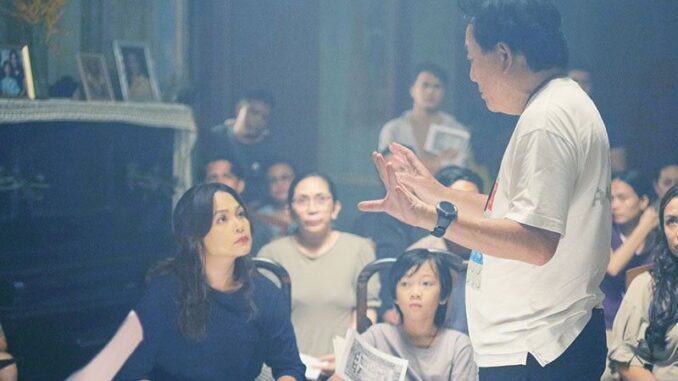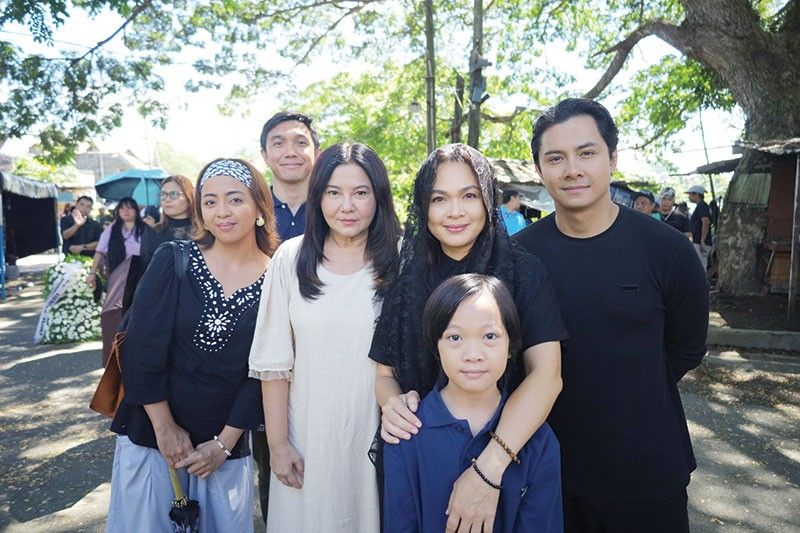
MANILA, Philippines — “Espantaho” (Scarecrow) is a tale of family and forgiveness, told in the drama-horror genre. For the audiences, it could also be a tale of great ensemble acting. You know the kind that complements the genre because the portrayal keeps one on the edge of one’s seat.
Such an inspired collective performance is attributed to the commitment of the lead and supporting cast members, the guidance of director Chito Roño, and the engaging, multi-layered screenplay of Chris Martinez.
Kudos to all of them.
Since actors are storytellers, their portrayal of the characters moves the narrative and sets it in a different pace or motion until every viewer understands the personal connection of this dramatis persona to another and the role and representation of “espantaho” to the eerie and supernatural atmosphere that envelops the abode and household of Monet, played by Judy Ann Santos.
Director Chito gives guidance on set to Mon Confiado and Janice de Belen, who play the half-siblings of Monet.
The Best Actress winner of the recently-concluded Metro Manila Film Festival (MMFF) Gabi ng Parangal serves as a reliable point person for the viewer in navigating the conflict among the living, plus the one who has never crossed over yet, and the conflict among human beings and supernatural entities.
Judy Ann puts one in a temporary quandary to make sense if the attacks or changes in behavior of Monet are brought about by the unseen or a health condition.
Along this line is her ability to step into interacting and intersecting lines, within the reality of Monet’s world, to naturally communicate with the living and the one who has left but is still very much around, the ghost of Monet’s mom, Rosa.
The viewer can imagine the difficulty of seeing and hearing someone else aside from the ones who inhabit the same space as Monet’s, as well as in considering the thoughts of those around her.

Chanda Romero plays the legal wife character named Adele, while Tommy Abuel portrays the professor.
Judy Ann pulls off her scenes, showing explicitly and implicitly the roles Monet takes on, such as a devoted daughter, a loving mother and wife, a good “caretaker” of an ancestral house, and a respectful sibling and person. The character’s trusting nature, however, may be seen as problematic, but love makes one unable to see another person’s true intention, as one may put it.
Lorna Tolentino engages one that she’s a “spirit” or “earthbound” of a loving and caring mother, who, even though her presence is invisible to many, does everything to fight for what her daughter deserves and encourages the latter to assert herself. It could be for the material wealth or the acceptance from the matriarch of Monet’s half-siblings.
Chanda Romero is also equally engaging in essaying the legal wife character named Adele with a clear intention and motivation to get everything, from the house to the farm land, and to deprive Monet from enjoying any inheritance.
Through Chanda, one can sympathize with Adele, the woman who was abandoned by a man she truly loved, even if the character is mean in actions and words.
Balancing the high and intense emotions of Adele are the understanding and fair brother and sister Roy and Andie. Janice de Belen and Mon Confiado ably portray stepsiblings to Monet, who take a neutral stance in the family situation and never take sides. One could feel their concern for Monet.

Photos courtesy of Quantum Films
Tommy Abuel, as the professor, and Eugene Domingo, as the psychic and folk healer, who will help Monet and Adele unearth the mystery and truth about the espantaho image in a painting brought by Monet’s husband and its connection to Rosa, once a muse of a visual artist, are a delight to see and watch.
Their portrayal has somehow given the viewer hope that there’s a path to save those who are trapped in the painting and stop the disappearances of people.
Kian Co and JC Santos, as the son and husband of Monet, Donna Cariaga and Nico Antonio, friend workers of Monet at her antique shop, and Arci Adamos, the painter, deliver portrayals that make everything in the life of Monet interesting and seem real.
The performance of the actors, regardless of the length of their characters’ screen time or appearance, plays a vital role to narrate a horror drama about love and forgiveness, living and leaving, coming together and moving on.
“Espantaho,” an MMFF official entry and a production of Quantum Films, is now showing in theaters nationwide.


Be the first to comment